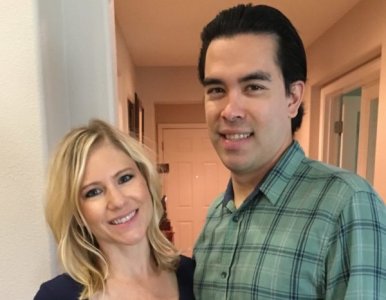This woman's story about love and early-onset dementia tugs people's heartstrings
By
Danielle F.
- Replies 5
Navigating the complexities of marriage can be challenging enough, but imagine the heartbreak when the person you love starts to change before your eyes, and not for reasons you can easily understand or fix.
This is the story of Kristin Holloway, whose husband, Lee, began to show signs of a drastic personality change, leading her to fear the worst for their relationship.
However, she discovered a condition that would alter their lives forever.
Kristin and Lee's love story began at Cloudflare, a cybersecurity firm Lee co-founded, where they met and quickly became engaged.
They married in the idyllic setting of Maui in 2015 and welcomed a baby the following year.
Soon after, Lee's behaviour began to shift in alarming ways.
The once energetic and dedicated professional started missing work, lashed out at colleagues, and withdrew into himself as he repeatedly spent days on the couch watching the same movie.
Kristin initially feared these were signs of a failing marriage, a mid-life crisis, or that Lee was unhappy with their lives.
However, the truth was far more devastating.
In January 2017, a neuropsychologist diagnosed 35-year-old Lee with frontotemporal dementia (FTD)—a rare and aggressive form of the disease that typically affects individuals in their 30s and 40s.
Frontotemporal dementia was the same condition that struck Hollywood actor Bruce Willis and TV host Wendy Williams.
FTD is a disease that can be particularly cruel.
It often begins with changes in behaviour and personality rather than memory loss, which is more commonly associated with Alzheimer's disease.
Lee's case was no different—he became apathetic, combative, and eventually nonverbal, requiring constant care.
Kristin made the heart-wrenching decision to live separately from Lee to give their son a normal life despite feeling alone in their marriage.
The diagnosis of FTD brought with it a grim prognosis: the average life expectancy following an FTD diagnosis is about seven and a half years.
Lee, now 43, lives with round-the-clock care funded by the success of Cloudflare's public offering.
Kristin visits him with their son, but they now lead separate lives—a decision made out of necessity and love.
Kristin's journey led her to become an advocate for those affected by FTD.
She joined the board of the Association for Frontotemporal Degeneration and started the Holloway Family Fund in Lee's honour.
Her advocacy helped launch an annual summit for FTD researchers and doctors.
Her efforts are driven by the hope of finding a cure and raising awareness about a disease that remains in the shadows.
The Holloways' story reminds us that dementia does not only affect the elderly.
It can strike in the prime of life, bringing challenges that are often misunderstood or misdiagnosed.
This story may resonate personally—as it may affect family members or friends.
It's essential to support one another and share knowledge about conditions like FTD.
If you or someone you know is experiencing similar changes in behaviour or personality, it's crucial to seek medical advice.
We wish Kristin Holloway all the best in her advocacy.

If you have a story to share or want to send messages of support for the Holloways, we invite you to write them in the comments below.
This is the story of Kristin Holloway, whose husband, Lee, began to show signs of a drastic personality change, leading her to fear the worst for their relationship.
However, she discovered a condition that would alter their lives forever.
Kristin and Lee's love story began at Cloudflare, a cybersecurity firm Lee co-founded, where they met and quickly became engaged.
They married in the idyllic setting of Maui in 2015 and welcomed a baby the following year.
Soon after, Lee's behaviour began to shift in alarming ways.
The once energetic and dedicated professional started missing work, lashed out at colleagues, and withdrew into himself as he repeatedly spent days on the couch watching the same movie.
Kristin initially feared these were signs of a failing marriage, a mid-life crisis, or that Lee was unhappy with their lives.
However, the truth was far more devastating.
In January 2017, a neuropsychologist diagnosed 35-year-old Lee with frontotemporal dementia (FTD)—a rare and aggressive form of the disease that typically affects individuals in their 30s and 40s.
Frontotemporal dementia was the same condition that struck Hollywood actor Bruce Willis and TV host Wendy Williams.
FTD is a disease that can be particularly cruel.
It often begins with changes in behaviour and personality rather than memory loss, which is more commonly associated with Alzheimer's disease.
Lee's case was no different—he became apathetic, combative, and eventually nonverbal, requiring constant care.
Kristin made the heart-wrenching decision to live separately from Lee to give their son a normal life despite feeling alone in their marriage.
The diagnosis of FTD brought with it a grim prognosis: the average life expectancy following an FTD diagnosis is about seven and a half years.
Lee, now 43, lives with round-the-clock care funded by the success of Cloudflare's public offering.
Kristin visits him with their son, but they now lead separate lives—a decision made out of necessity and love.
Kristin's journey led her to become an advocate for those affected by FTD.
She joined the board of the Association for Frontotemporal Degeneration and started the Holloway Family Fund in Lee's honour.
Her advocacy helped launch an annual summit for FTD researchers and doctors.
Her efforts are driven by the hope of finding a cure and raising awareness about a disease that remains in the shadows.
The Holloways' story reminds us that dementia does not only affect the elderly.
It can strike in the prime of life, bringing challenges that are often misunderstood or misdiagnosed.
This story may resonate personally—as it may affect family members or friends.
It's essential to support one another and share knowledge about conditions like FTD.
If you or someone you know is experiencing similar changes in behaviour or personality, it's crucial to seek medical advice.
We wish Kristin Holloway all the best in her advocacy.
Key Takeaways
- A woman shared her experience of her young husband's unexpected behavioural changes, which were initially thought to be a mid-life crisis but turned out to be symptoms of early-onset dementia.
- Her husband, Cloudflare co-founder Lee Holloway, was diagnosed with frontotemporal dementia (FTD), a rare and aggressive form of the disease.
- Despite initial denial, the condition progressed, leaving Lee nonverbal and requiring round-the-clock care.
- The story highlighted the lesser-known FTD, which presents personality and behavioural changes rather than the memory issues commonly associated with Alzheimer's.







